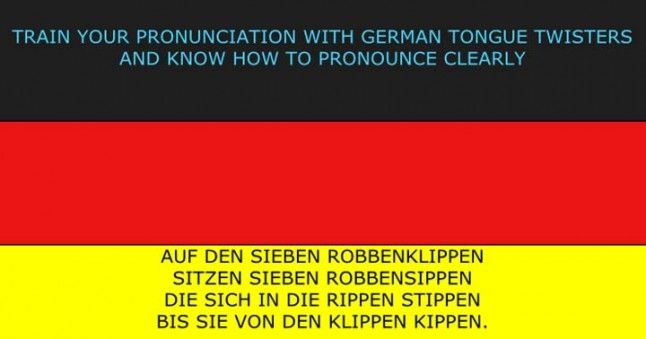So, you know, German is meant to be a difficult language. I won’t argue, it is difficult indeed. As English is not a phonetic language either you might understand me, if I say, that German phonetics is not always as clear as it could be. Compared to other European languages like Spanish or Italian, well, yes, German phonetic is sometimes hard to understand. To make it easier for you to train the phonetics, I looked around for German tongue twisters to help you.
Train Your Tongue with Tongue Twisters
You can really improve your articulation of German words by training with tongue twisters. Radio and TV presenters use them to warm up before a speech and often use tongue twisters in foreign languages to get used to the pronunciation. The muscle in the tongue is the most important muscle when it comes to speaking. It has to be trained a lot. For your normal use of language it is usually trained enough for average adults. But if you need to held speeches in front of an audience or if you want to work on radio or television, a clear articulation, and therefore a fully trained tongue, is crucial.
Children, whose tongue is not trained enough, have lessons at a speech therapist to train their tongue. You don’t need a speech therapist, we’ll help you!
Use German Tongue Twisters to Train Your Tongue
So, why should you learn German tongue twisters? I have two easy answers. On the one hand you can learn a funny long German tongue twister by heart to impress your friends and make them laugh. You would be a sophisticated entertainer on every party. Who, apart from you and the Germans, would be able to say:
Auf den sieben Robbenklippen sitzen sieben Robbensippen, die sich in die Rippen stippen, bis sie von den Klippen kippen.
So, on the other hand, you might really want to learn German and want to have a good pronunciation. So you can do the same and train the sentence to have a clear pronunciation of “R” and “S”. But I would rather recommend you to start with an easy one.
German Tongue Twisters to Start With
To start your pronunciation lesson, you should begin with those tongue twisters containing two or three words, like “lila Flanellläppchen”. It’s pretty easy to say once and on its own. It’s more difficult if you try to pronounce it several times, like three times in 20 seconds.
Very Short German Tongue Twisters
- chinesisches Schüsselchen
- Plättbrett bleibt Plättbrett
- Haifischschwanzflossenfleischsuppe
- Oachkatzelschwoaf (From Bavaria)
If you are sure with this you can take the next step with the classic at least for Germans “Blaukraut bleibt Blaukraut und Brautkleid bleibt Brautkleid”. It consists of only four different words, but gets pretty hard to say after several intervals.
Classical German Tongue Twisters
- Fischers Fritz fischt frische Fische. Frische Fische fischt Fischers Fritz.
- Als Anna abends ass, ass Anna abends Ananas.
- Der Whiskeymixer mixt den Whiskey für den Whiskeymixer. Für den Whiskeymixer mixt der Whiskeymixer den Whiskey.
Do you want to learn more? We provide you with an online document with lots of German tongue twisters.
Do it Like the Pros using Tongue Twisters
As already stated before, radio and television presenters use tongue twisters to warm up and to train their articulation. Do it like the pros and get yourself to pronounce the following German tongue twister:
„Wussten sie schon, dass wenn in Reden von Walzwerken und Waldzwergen die Rede ist, es zu Irritationen beim Hörer führt, da es phonetisch nicht ganz leicht ist zu unterscheiden, ob es sich um Walzwerke oder Waldzwerge handelt. Gott sei Dank, ist es aber relativ selten, dass ein Waldzwerg ein Walzwerk besucht oder Walzwerke in der Umgebung der Waldzwerge erbaut werden. Wenn allerdings Waldzwerg ein Walzwerk baut, handelt es sich demzufolge um ein Waldzwergwalzwerk. Wenn dieser dann auch noch darin arbeitet ist es dann offensichtlich ein Walzwerkwaldzwerg.“
If you can pronounce this clearly and without difficulties, you shouldn’t have any problems with any German word in any German language class.

